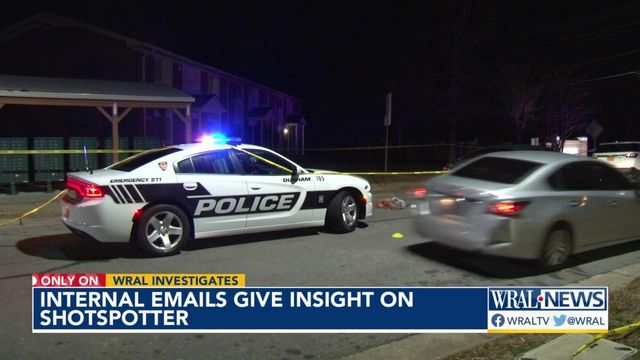Emails provide glimpse of tense exchanges between Durham police chief, ShotSpotter reps
WRAL Investigates went through more than 350 pages of city emails about the ShotSpotter technology.
Posted — UpdatedWRAL Investigates went through more than 350 pages of city emails about the technology. The city is undergoing a yearlong pilot program for ShotSpotter in a three-square-mile area in east and southeast Durham.
The ShotSpotter sensors are supposed to notify police when they hear gunfire and where.
ShotSpotter’s supporters think it will improve response times, enabling police to collect better evidence. Its critics worry about privacy and unnecessary police interactions.
Emails obtained by WRAL Investigates show city leaders had another concern prior to its launch: the additional workload it will bring to an already understaffed department.
Durham Fraternal Order of Police spokesperson Larry Smith, a retired deputy chief of the Durham Police Department, said the concerns are valid.
“Any time you have an increase in workload, which is what ShotSpotter is doing apparently, it's doing what it's supposed to do, then the department is going to have to decide how they prioritize their staffing based on their workload to manage that,” Smith said.
Several emails detail the city’s concerns about technology:
- In a July 2022 email, an employee with the police department's Forensic Services Division said more shell casings coming in “could cause a significant backlog” on processing “fired cartridges,” especially considering that team is already “behind.”
- Another email from July 2022 shows the Durham Police Department created a new Crime Analyst position specifically dedicated to ShotSpotter.
The police department said the analyst “is responsible for data collection and analysis relating to the program.”
“If you’re going to have this technology, then it’s nice to have a human person analyzing it,” Smith said.
Smith said ShotSpotter can help police better understand where shootings are most likely happening.
“What can you learn from it?” Smith said of ShotSpotter. “How can it impact maybe how you deploy your officers [and how you] deploy your specialized units?
“So, I imagine that's what they're doing with that new analyst.”
WRAL Investigates asked the Durham Police Department to ask what ShotSpotter has meant for the department's workload.
"We have experienced a slight increase with the collection of evidence from ShotSpotter," a Durham police spokesperson wrote. "The casings from these calls are prioritized and entered into the Nibins system for comparison for possible connections to other cases.
"The results are immediately forwarded to the investigators."
An email exchange between Durham Police Chief Patrice Andrews and ShotSpotter executives reveals a strained relationship. Tensions boiled over when a ShotSpotter executive accidentally sent Andrews an email that she perceived to be mocking her use of pronouns in her email signature.
"Do you also have an email for she/her/hers 😊?" one ShotSpotter executive wrote to another coworker.
Andrews demanded a “formal letter of apology,” writing, “I feel as though I have been made a target because my team and I will not allow ShotSpotter to come in and dictate how the City of Durham deploys and analyzes your technology.”
On March 6, ShotSpotter provided WRAL News with the following statement:
“At the time we were made aware of our employees’ comments last year, we extended our sincerest apologies to Chief Andrews without delay for this inappropriate and hurtful communication," a ShotSpotter spokesperson wrote. "ShotSpotter strongly supports every individual's right to self-expression and identity, and their ability to share it publicly.
"The message sent does not reflect ShotSpotter’s values, and we do not condone the behavior. Appropriate disciplinary measures were immediately taken and ShotSpotter used the unfortunate circumstance to remind all employees of our cultural values.”
The emails also show ShotSpotter aggressively trying to sell more services to Durham police, including the company’s case management and crime management departments. The add-ons would have been in addition to the city’s gunshot detection and crime gun tracking system.
Durham city staff declined the add-ons. The emails did not state how much more the additional ShotSpotter add-ons would have cost.
Durham’s year-long pilot program for ShotSpotter will cost the city $197,500.
Related Topics
• Credits
Copyright 2024 by Capitol Broadcasting Company. All rights reserved. This material may not be published, broadcast, rewritten or redistributed.






